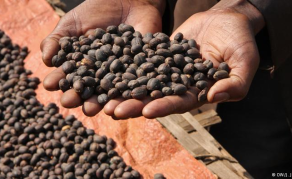 |
| Ethiopian Coffee |
Agriculture remains
the leading sector in Ethiopia's economy and an important source of
economic growth. It contributes 39 percent of the country's Gross
Domestic Product (GDP) and provides employment opportunities for about
73 percent of the population.
The sector has also
the lion's share in Ethiopia's export performance by contributing 77.5
percent of the country's foreign currency earnings during the past 11
months of the current fiscal year followed by manufacturing and mining
with an aggregate share of 21.4 percent.
As it is known, the
government of Ethiopia has been giving due emphasis to enhance the
product and productivity of the agriculture sector by formulating a
strategy known as Agricultural Development-Led Industrialization (ADLI)
in 1992 to create a conducive environment for growth in the sector.
Under the ADLI,
Ethiopia has set successive five-year plans that evidently successful in
enabling the country to register an average 7 percent agricultural
growth during the past 11 years and; significantly improved agricultural
exports.
While coffee
extends its dominance in Ethiopia's export revenue by generating over
722.4 million USD during the 2015/16 fiscal year, oil seeds and chat
remain the second and fourth hard currency earning commodities with
472.6 and 262.4 million USD respectively.
Despite this
success and their pivotal role for Ethiopia's export, the performance of
agriculture commodities remained largely fluctuating that led to
irregularity of earnings over years.
Sources indicated
that the revenue obtained from commodities under the supervision of the
Ministry of Trade during the past 11 months has shown a 4 four percent
decline compared to a revenue gained in last year same period.
The amount of
revenue Ethiopia has been expecting to earn from export of coffee,
sesame and other major exportable items has also been inconsistent due
to inability to meet the international quality standards.
Experts in the
field stated that even though Ethiopia's too much dependence on few
exportable items coupled with a negative impact El Niño induced drought
could be contributing factors, to the failure to meet the international
quality standard is the major cause for this export glitch.
The experts stated
lack of appropriate and modern technology in agriculture value chain is
the major hindrance in the export quality. Furthermore, poor handling,
packaging and storage techniques as well as inefficient infrastructural
connectivity also play a negative role in hampering the competitiveness
of Ethiopia's agricultural commodities in the global market.
The aforementioned
problems also believed to reduce the price of Ethiopia's coffee in the
world market from those coming from Brazil and Vietnam.
Recognizing the
problem, the government has taken measures including conducting
commodity quality and safety inspection tests that have aimed at
improving quality of exportable agricultural commodities.
Consultations had
also been held with farmers' cooperatives of the oil seed and cereal
growing States and technical support have been given to stakeholders in
the agriculture value chain.
Besides, active
follow up mechanisms were also set with State governments to enhance the
capacity of smallholder farmers who are accountable for the majority of
Ethiopia's agricultural export.
In this regard,
Ministry of Trade has played a pivotal role in deploying its staffs paid
a field visit to various States with the aim of bolstering the market
chain among farmers, cooperatives and Ethiopian Commodity Exchange
/ECX/. The visits bore fruit to identify quality related problems in the
agricultural value chain and to provide the necessary solutions.
ECX's decision to
expand its warehouses in oil seed and cereal growing states is also
believed to significantly reduce poor storage facilities caused quality
problem.
Experts called on
due attention to be given to improve agricultural commodities quality so
as to enable the country remain a strong competitor in the world
agricultural market and to get a reliable destination for its exports.
Enhancing quality of agricultural commodities would also have a role to increase the benefit Ethiopia could get from the sector.
Bearing the stated
facts in mind, the government should further extend its engagement to
enable smallholder farmers to have access to appropriate and modern
farming technologies either individually or under farmers' cooperatives.
Improving storage
facilities and enhancing the transport system would also be essential to
a timely delivery of exportable items particularly for cut flowers,
meat and vegetables while satisfying the international quality
standards.
Though commendable
results gained in branding coffee products more has to be done to brand
additional coffee and sesame produces grown in various parts of the
country to attain more foreign currency.
Capacity building
trainings should be offered to smallholder farmers and model plots need
to be prepared to introduce farmers with modern farming technologies and
build their understanding in practical way.
Furthermore,
development agents have huge responsibility to train smallholder farmers
and teach them the link between improving quality with increasing the
amount of money they put in their pockets.










No comments:
Post a Comment